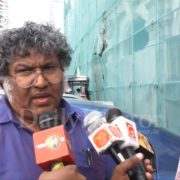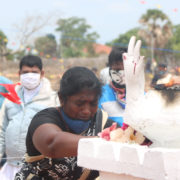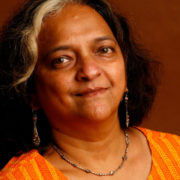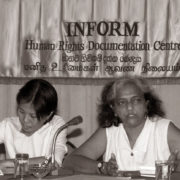DOWNLOAD FULL REPORT: ENGLISH | SINHALA | TAMIL |
Summary:
September was a month that saw almost daily incidents of repression of dissent. A commemoration planned for a well-known woman human rights defender and academic, Dr. Rajani Thiranagama, was obstructed when two pre-booked venues were withdrawn and a protest march was banned by the Police. A prayer service for displaced Tamils in the district of Jaffna was banned, and Police in Batticaloa obtained court orders to ban commemorations for persons killed twice within two weeks.
In Colombo, two human rights lawyers received death threats and opposition trade unionists were assaulted. The Military obstructed journalists from trying to report on the situation in the Aluthgama area where anti-Muslim riots took place in June. Journalists covering the post-election situation in the Uva province were assaulted, one of the men was hospitalized for several weeks due to his serious injuries. A Northern Tamil journalist narrowly escaped death and a Tamil media activist in Jaffna was subjected to continuous questioning, intimidation and harassment. A Tamil Catholic Priest in Jaffna was questioned after he wrote a poetry book about his war time experiences and a number of school Principals were also questioned for receiving the book. Pressure by extremist groups led to the withdrawal of a literary award to a Sinhalese writer now living in exile due to death threats, due to his criticial political views of the government. The four (out of five) judges who chose him as the awardee were also discredited by an extremist writer supportive of the government.
A training workshop for web journalists was disrupted in Negombo. A civil society organized meeting in Trincomalee was also disrupted when venues were withdrawn twice and the meeting was subjected to surveillance. An Australian University admitted to un-inviting two prominent Sri Lankan human rights defenders after they were invited to participate in an international conference, due to pressure from the Ministry of Defence. Police unleashed water cannons and tear gas to supress a peaceful protest by Catholics over a statue. When a protest calling for the release of a prominent anti-disappearance campaigner whose son had disappeared was held in Colombo, a group that held a counter protest distributed leaflets portraying her as a terrorist supporter, despite there being no charges brought against her 200 days after being detained. A banner displayed at the counter-protest showcased photos of 8 human rights defenders depicting them as traitors.
Student activists also faced suppression. Protesting students were threatened and protest banners were destroyed by the Chairman of the Moneragela Pradeshiya Saba. Police surrounding the Buddhist and Pali University searched the premises and demanded the handover of 4 student leaders. Opposition parties were subjected to a series of attacks and intimidation in the lead up to the elections in the Uva Province and there was a call for lists of opposition party activists working as government officials, which was seen as an initial move to persecute them for their political affiliations. Secretary to the Ministry of Defence accused a leading Tamil political party of causing political turmoil and encouraging separatist sentiments. The Deputy British High Commissioner was watched when she visited the Eastern Province and some of the people she met were questioned afterwards. A family that was visited by the British High Commissioner in the North was also questioned.
There were no visible attempts by authorities to address the continuing incidents of suppression of dissent. As before, government politicians, government officials, police, military, state media and journalists sympathetic to the government appear to be responsible for most reported incidents in September, and relevant institutions, such as the Police, appear unwilling to take actions even when complaints are made.





Comments